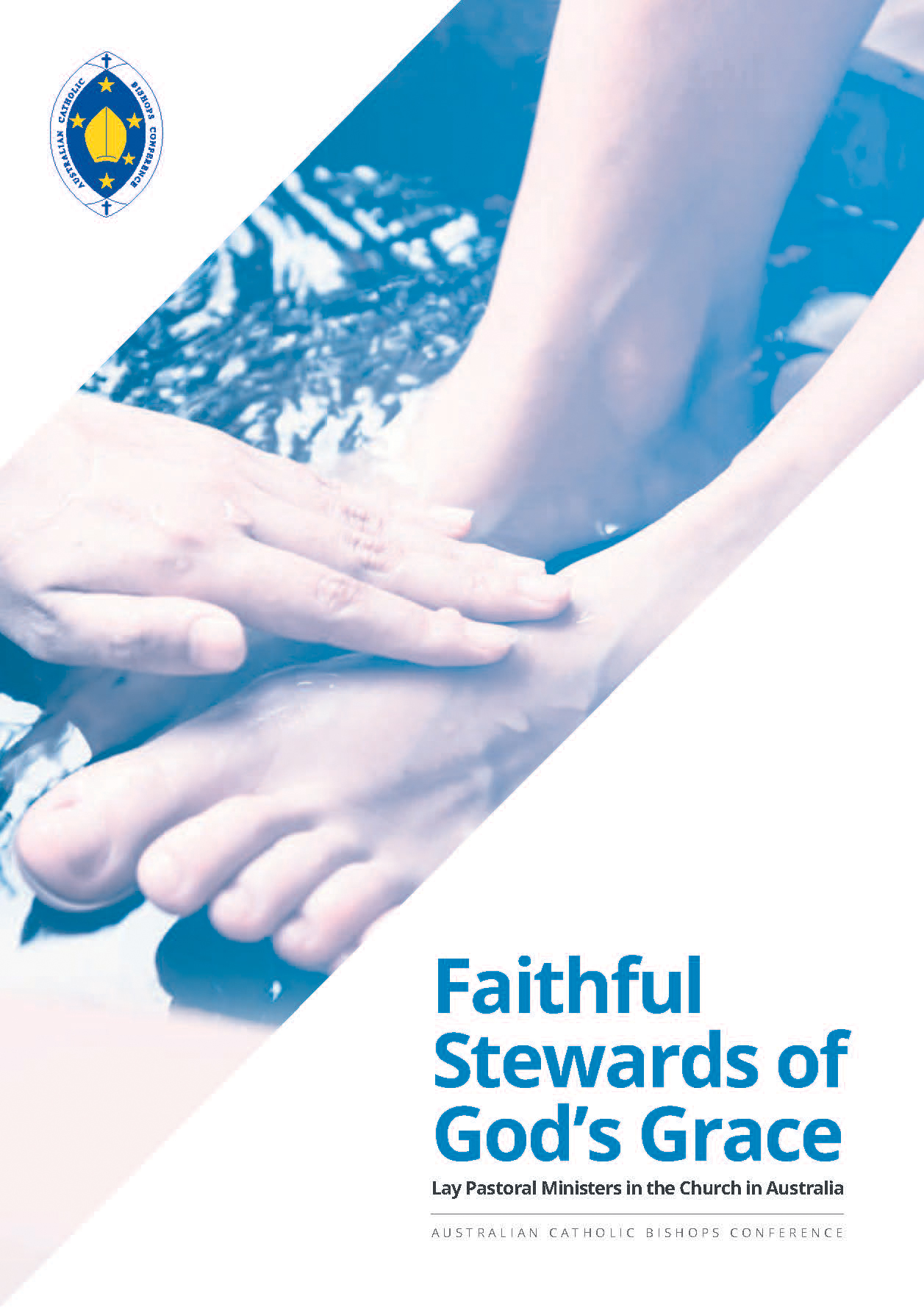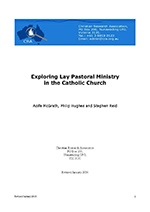 "Lay people undertake a variety of ministries in parishes, schools, and Church institutions and agencies as diverse as Aboriginal Catholic Ministry, Catholic Earthcare, Catholic Mission, Marriage Tribunals, Catholic Development Funds, Caritas Australia and Catholic media offices. Lay people serve in mission and pastoral care roles with migrants and refugees, Catholic hospitals, aged care facilities, correctional services, and with the military. Many ministries are occasional and usually unpaid: for example, the various ministries associated with liturgy, including acolytes, ministers of the word, extraordinary ministers of Holy Communion, cantors and music ministers, altar servers and sacristans, and other parish-based roles such as membership of parish pastoral councils, finance committees, visitation teams, sacramental preparation teams, youth and family groups and social justice groups. Lay people give their time and gifts freely for the good of the Church community and the wider community in the name of Jesus Christ, and are authorised and commissioned in the name of the local Bishop."
"Lay people undertake a variety of ministries in parishes, schools, and Church institutions and agencies as diverse as Aboriginal Catholic Ministry, Catholic Earthcare, Catholic Mission, Marriage Tribunals, Catholic Development Funds, Caritas Australia and Catholic media offices. Lay people serve in mission and pastoral care roles with migrants and refugees, Catholic hospitals, aged care facilities, correctional services, and with the military. Many ministries are occasional and usually unpaid: for example, the various ministries associated with liturgy, including acolytes, ministers of the word, extraordinary ministers of Holy Communion, cantors and music ministers, altar servers and sacristans, and other parish-based roles such as membership of parish pastoral councils, finance committees, visitation teams, sacramental preparation teams, youth and family groups and social justice groups. Lay people give their time and gifts freely for the good of the Church community and the wider community in the name of Jesus Christ, and are authorised and commissioned in the name of the local Bishop."
(Faithful Stewards of God's Grace, page 14).
The first national resource for lay pastoral ministry, Faithful Stewards of God’s Grace was launched by the President of the Australian Catholic Bishops Conference, Archbishop Mark Coleridge, in July 2018.
Since the arrival of the first Catholics in Australia in 1788, lay people have exercised significant roles in the fundamental task of Christian discipleship - proclaiming the Kingdom of God and being an initial budding forth of that Kingdom1. By bearing witness to their Christian faith, they have passed on its treasures to their families and communities. In partnership with clergy and religious, they have contributed to the building up of the Church and the transformation of society according to the plan of God (Faithful Stewards of God's Grace, page 6).
Today, lay people undertake a variety of ministries in parishes, schools, and Church institutions and agencies as diverse as Aboriginal Catholic Ministry, Catholic Earthcare, Catholic Mission, Marriage Tribunals, Catholic Development Funds, Caritas Australia and Catholic media offices. Lay people serve in mission and pastoral care roles with migrants and refugees, Catholic hospitals, aged care facilities, correctional services, and with the military. Many ministries are occasional and usually unpaid: for example, the various ministries associated with liturgy, including acolytes, ministers of the word, extraordinary ministers of Holy Communion, cantors and music ministers, altar servers and sacristans, and other parish-based roles such as membership of parish pastoral councils, finance committees, visitation teams, sacramental preparation teams, youth and family groups and social justice groups. Lay people give their time and gifts freely for the good of the Church community and the wider community in the name of Jesus Christ, and are authorised and commissioned in the name of the local Bishop (Faithful Stewards of God's Grace, page 14).
The reality of lay ministry is therefore quite diverse: temporary and permanent, part-time and full-time, unpaid and paid, occasional and permanent or contracted. There are different paths in the spiritual life and in the apostolate exercised by individual members of the lay faithful. Their commitment to ministry should take a shape and form that remains in harmony with their particular life commitments and circumstances. Lay people have adapted to new ministries in openness to the promptings of the Holy Spirit, and in a dynamic movement towards others, which is a fundamental feature of a life lived in holiness. At its best, there is a commonality shared by all these variants: lay people have generously responded to the call of their Baptism, accepted the tasks and offices for which they were made fit and ready and played their part for the good of the whole body of the faithful (Faithful Stewards of God's Grace, page 15).
Definition
‘Lay pastoral ministry’ is a general term for the service offered by some authorised women and men in the Church. It refers not to one position or context, but to a wide range of possible roles across a multitude of pastoral settings (Faithful Stewards of God's Grace, page 32).
Lay pastoral ministries provide ‘a special complementary capacity for service,’ in partnership with the teaching, sanctifying, and governing functions of ordained ministry2 (Faithful Stewards of God's Grace, page 16).
Scope
Lay pastoral ministry, like all forms of ministry in the Church, is a participation in the ministry of Christ. Thus, while all disciples ‘should find ways to communicate Jesus wherever we are,’ this is especially true for lay pastoral ministers. These have the task of spreading Christ’s message of communion, of witnessing to Christ, and initiating others into the way of Christian discipleship, through their work within the life of the Church. They are also tasked with maintaining a real commitment to applying the Gospel to the transformation of society. Their pastoral activity needs to consistently embody and promote a meaningful relationship with Christ. This relationship ‘heals, promotes and reinforces interpersonal bonds’ with members of the community of the faithful, and with God.
Lay pastoral ministers, in their leadership responsibility within the community, assist other disciples to ‘remain steadfast in [their] intention to respect others, to heal wounds, to build bridges, to strengthen relationships and to “bear one another’s burdens” (Gal 6:2).’ By accompanying and assisting others in this way, lay pastoral ministers enable and encourage the transformation of the world (Faithful Stewards of God's Grace, page 30).
History
In 2012, the Australian Catholic Bishops Conference established the Australian Catholic Council for Lay Pastoral Ministry to foster collaboration amongst dioceses and to facilitate a national approach to aspects of pastoral ministry.
The Australian Catholic Council for Lay Pastoral Ministry advises the Bishops Commission for Evangelisation, Laity and Ministry in the promotion of the life and mission of the Catholic Church in Australia in the areas of:
- Support of lay pastoral ministers in their service to the Church
- Assistance of lay pastoral ministers with accreditation and employment relations:
- The promotion of the role and value of lay pastoral ministers.
The Australian Catholic Council for Lay Pastoral Ministry conducted a qualitative survey among Catholic dioceses in Australia to obtain a general understanding of the national landscape of lay pastoral ministry. This was followed by a more in-depth study, involving case studies from diverse pastoral settings across Australia by the Christian Research Association in 2015.
1 Vatican II Council. Lumen Gentium (hereafter LG), Dogmatic Constitution on the Church. Collegeville, MN.: Liturgical Press; 1975. nn. 5, 10.
2 CL 20; Pope John Paul II. Instruction on certain questions regarding the collaboration of the non-ordained faithful in the sacred ministry of priest. Vatican City: Libreria Editrice Vaticana; 1997. n. 2.
 Faithful Stewards of God’s Grace
Faithful Stewards of God’s Grace
The first national resource for lay pastoral ministry, Faithful Stewards of God’s Grace was launched by the President of the Australian Catholic Bishops Conference, Archbishop Mark Coleridge, in July 2018.
Chapter one provides an overview of the development of lay pastoral ministry in Australia from 1788 to the present day. Chapter two seeks to identify the complexities involved in lay pastoral ministry. Chapter three seeks to understand the place of lay pastoral ministry within the common vocation of discipleship, and how it relates to other forms of ministry. Chapter four offers a practical description of lay pastoral ministry and outlines a process of authorisation, from certification to commissioning. Chapter five proposes recommendations that will enable a shared vision to be fulfilled in practice.
 Exploring Lay Pastoral Ministry in the Catholic Church
Exploring Lay Pastoral Ministry in the Catholic Church
In 2015, the Australian Catholic Council for Lay Pastoral Ministry (ACCLPM) commissioned the Christian Research Association (CRA) to carry out a project to examine lay pastoral ministry in the Catholic Church in Australia. The outcome of this initial phase of research was the document authored by Aoife McGrath, Philip Hughes and Stephen Reid, Exploring Lay Pastoral Ministry in the Catholic Church, the final revised version of which appeared in February 2016.
Mission Planners Network of Oceania
Christian Initiation Australia Network
Australian Catholic Youth Ministry Network
Australian Pastoral Musician Network
Disclaimer: The National Centre for Evangelisation (NCE) reserves the right to list the names and contact details of relevant individuals/groups on this website at its discretion.
Also, while this website provides contact details and links to other websites, the NCE has no control over the nature, content and availability of those sites. The inclusion of any links does not necessarily imply a recommendation or endorse the views expressed within them. If you require further information about any individuals/groups linked to on this website, we encourage you to seek advice from your diocesan office or contact the individual/group directly.




